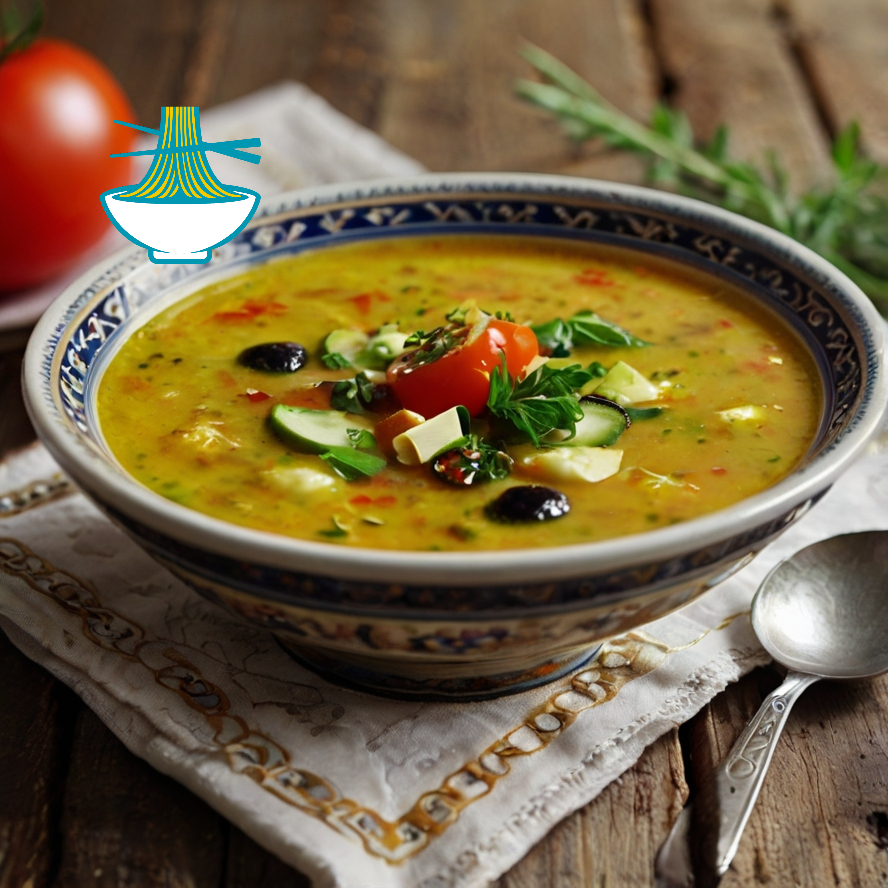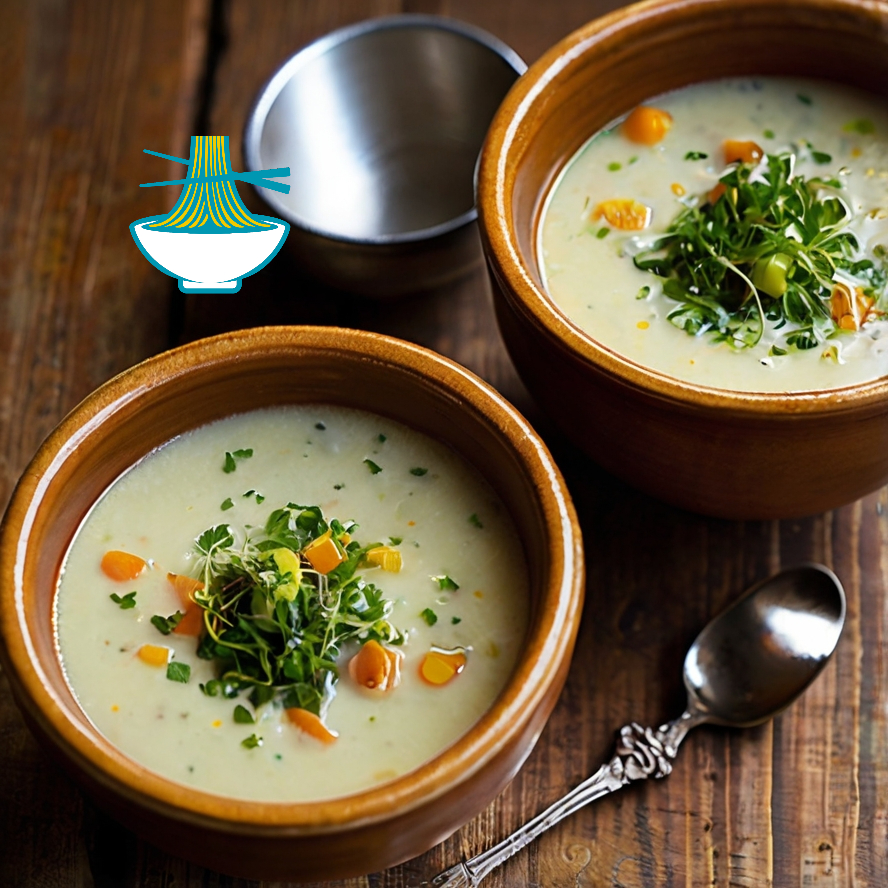Tarhana Çorbası is a beloved Turkish soup with a rich history dating back centuries. Made from a fermented mixture of yogurt, vegetables, and flour, it's dried and then rehydrated to create a hearty, tangy soup. This traditional dish reflects the resourcefulness of Anatolian cuisine, as it was historically prepared to preserve surplus ingredients. Today, it remains a cherished staple, offering both nourishment and a taste of Turkey's culinary heritage.
Ingredients:
- 1 cup tarhana mix (available at Middle Eastern markets or online)
- 4 cups water or broth
- 1 tablespoon olive oil
- 1 onion, finely chopped
- 1 tomato, diced
- 1 tablespoon tomato paste
- Salt and pepper to taste
- Optional: chopped fresh herbs for garnish
Method:
1. In a large pot, heat the olive oil over medium heat. Add the chopped onion and sauté until translucent.
2. Add the diced tomato and tomato paste to the pot, and cook for another few minutes until the tomato starts to break down.
3. Pour in the water or broth and bring to a simmer.
4. Gradually sprinkle in the tarhana mix while stirring continuously to avoid clumps.
5. Cook the soup over low heat, stirring occasionally, for about 15-20 minutes or until the tarhana is fully hydrated and the soup thickens.
6. Season with salt and pepper to taste.
7. Serve hot, garnished with chopped fresh herbs if desired. Enjoy your delicious and comforting Tarhana Çorbası!
Nutrition Value:
1. Tarhana Mix (1 cup):
- Calories: Approximately 100-150 calories.
- Carbohydrates: Varies, but typically around 20-30 grams.
- Protein: Varies, but usually contains around 5-10 grams.
- Fat: Typically low in fat, around 1-2 grams.
- Sodium: Can vary depending on the brand, but generally moderate, around 200-400 mg.
- Cholesterol: Usually low to nonexistent.
- Vitamins & Minerals: Contains a variety of B vitamins, such as B1 (thiamine) and B2 (riboflavin), as well as minerals like iron and calcium.
- Nutritional Benefit: Tarhana is a fermented grain and yogurt-based mixture, providing a good source of complex carbohydrates, protein, and some essential vitamins and minerals. It's also rich in probiotics due to the fermentation process, which can support gut health.
2. Water or Broth (4 cups):
- Calories: Negligible.
- Carbohydrates: Negligible.
- Protein: Negligible.
- Fat: Negligible.
- Sodium: Can vary depending on the type of broth or if salt is added.
- Cholesterol: Typically absent.
- Vitamins & Minerals: If broth is used, it may contain some vitamins and minerals depending on the ingredients used to make it.
- Nutritional Benefit: Provides hydration and can add flavor to the dish. Broth may also contribute some minerals and electrolytes.
3. Olive Oil (1 tablespoon):
- Calories: Around 120 calories.
- Carbohydrates: Negligible.
- Protein: Negligible.
- Fat: Approximately 14 grams, primarily monounsaturated fat.
- Sodium: Negligible.
- Cholesterol: Negligible.
- Vitamins & Minerals: Contains vitamin E and small amounts of vitamin K.
- Nutritional Benefit: Olive oil is rich in healthy monounsaturated fats, which can support heart health. It also provides antioxidants, such as vitamin E, which help protect cells from damage.
4. Onion (1 onion, finely chopped):
- Calories: Around 40-50 calories.
- Carbohydrates: Around 10-12 grams.
- Protein: Around 1 gram.
- Fat: Negligible.
- Sodium: Low.
- Cholesterol: Negligible.
- Vitamins & Minerals: Good source of vitamin C, potassium, and some B vitamins.
- Nutritional Benefit: Onions are rich in antioxidants, particularly flavonoids, which may have anti-inflammatory and anticancer properties. They also provide fiber and various vitamins and minerals, supporting overall health.
5. Tomato (1 tomato, diced):
- Calories: Around 20-30 calories.
- Carbohydrates: Around 4-6 grams.
- Protein: Around 1 gram.
- Fat: Negligible.
- Sodium: Low.
- Cholesterol: Negligible.
- Vitamins & Minerals: Excellent source of vitamin C, vitamin A, potassium, and other antioxidants like lycopene.
- Nutritional Benefit: Tomatoes are rich in vitamins, particularly vitamin C and vitamin A, as well as antioxidants like lycopene, which is linked to various health benefits including reducing the risk of certain cancers and promoting heart health.
6. Tomato Paste (1 tablespoon):
- Calories: Around 10-15 calories.
- Carbohydrates: Around 2-3 grams.
- Protein: Around 0.5 grams.
- Fat: Negligible.
- Sodium: Can vary, but often contains some salt.
- Cholesterol: Negligible.
- Vitamins & Minerals: Contains vitamins A and C, as well as some minerals like potassium.
- Nutritional Benefit: Tomato paste is concentrated, so it provides a rich tomato flavor and adds thickness to dishes. It also contributes some vitamins and minerals, particularly vitamins A and C.
7. Salt and Pepper (to taste):
- Calories: Negligible.
- Carbohydrates: Negligible.
- Protein: Negligible.
- Fat: Negligible.
- Sodium: Depending on the amount used, can contribute to sodium intake.
- Cholesterol: Negligible.
- Vitamins & Minerals: Negligible.
- Nutritional Benefit: Salt enhances flavor, and pepper adds a bit of heat and depth to the dish. However, excessive salt intake should be monitored due to its potential impact on blood pressure.
8. Optional: Chopped Fresh Herbs (for garnish):
- Calories: Negligible.
- Carbohydrates: Negligible.
- Protein: Negligible.
- Fat: Negligible.
- Sodium: Negligible.
- Cholesterol: Negligible.
- Vitamins & Minerals: Depending on the herbs used, they can provide various vitamins and minerals such as vitamin K, vitamin C, and potassium.
- Nutritional Benefit: Fresh herbs add freshness, flavor, and a pop of color to the dish. They also contain antioxidants and other beneficial compounds that contribute to overall health.


Comments